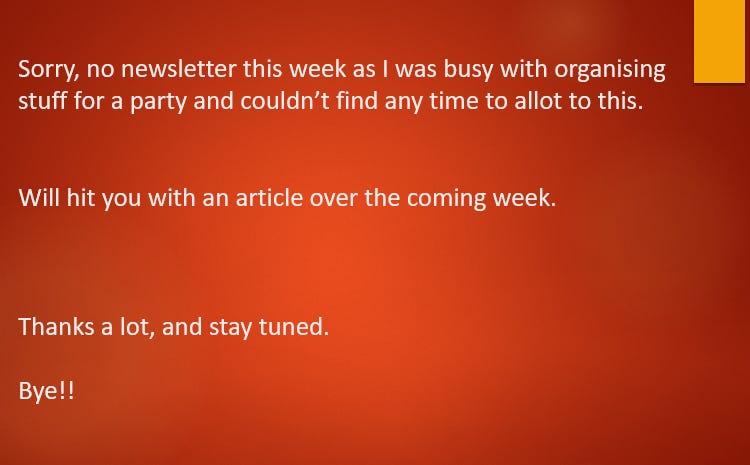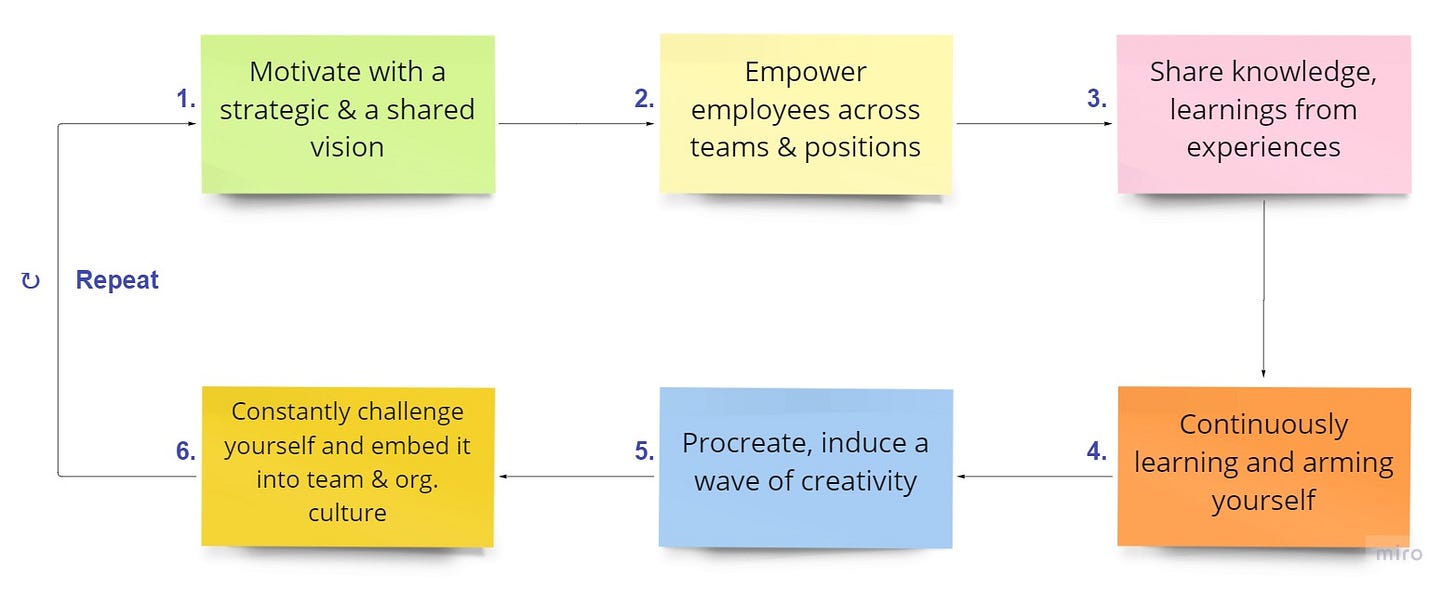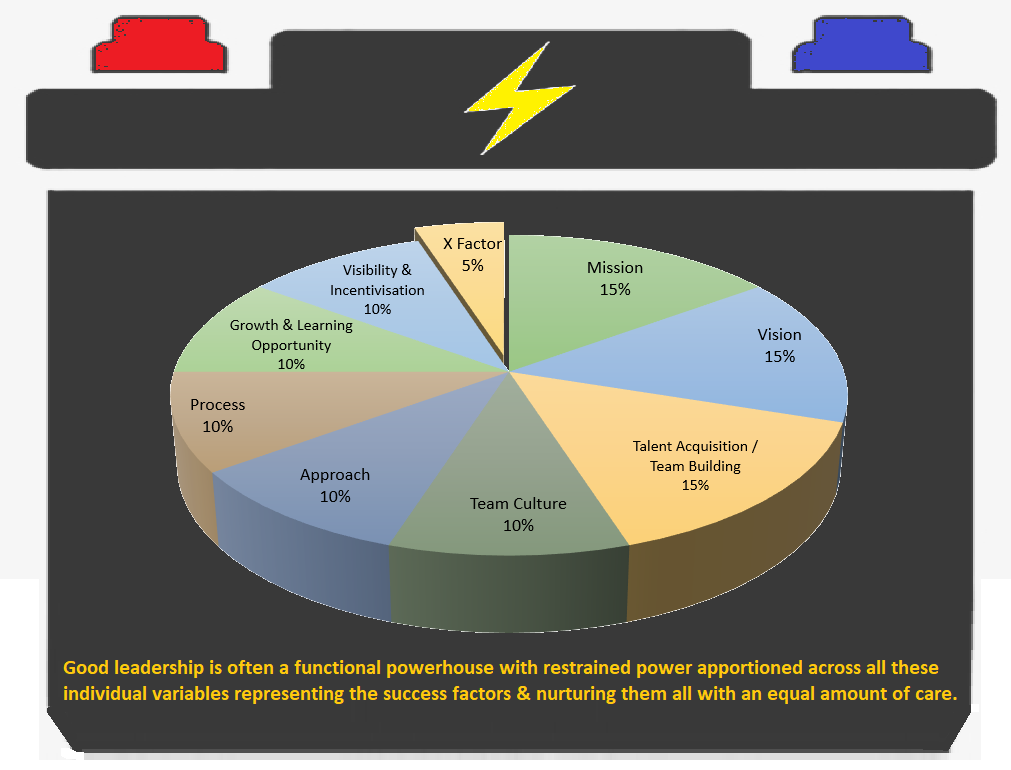Can Inspiration => Alignment!?
Is it possible that teams would align better if they were to be inspired in some way that could help them concentrate (or) if leaders themselves are deeply inspired rubbing it off onto the teams?
“Great leaders don’t create followers; they create more leaders.”
— Tom Peters.
“Sorry, I ain’t got time for that”!
Recently, I had my daughter’s 1st birthday party over a weekend and had the job of organising it all right from the start to finish, each and every chore. Though a birthday party, it was quite unlike the ones that are seen normally as the average age of mine - 50. It was more of an opportunity to get immediate family members & friends together, so no magic shows or the other kid’s birthday themed events / games that go with it.
The list of tasks to be managed were largely on the lines of:
Cherished each and every moment of organising it! Truly an amazing experience!
Managing the event could have been reason enough for me take off and not contribute to the weekly article and I know for a fact that tons of people would have bought the reason as well classifying it under the “Work-life-balance” banner.
And also, I could have easily slipped this sorry note in there to make things look more genuine.
But here you are, reading this right now.
I guess it’s normal when one becomes deeply passionate about one’s craft. When the inspiration comes from within, all that one is required to do is to just channelize that energy in setting tangible short-term / long-term goals and then being driven would be a natural course that happens automatically & subconsciously sans any extraneous effort.
“To Inspire” is a Must-Have Leadership Quality
Effective Management was an essential leadership trait some organisations swore by not too long ago. But, given today’s fast paced work environment especially that of start-ups, it’s often felt insufficient.
So, alongside effective management of resources, leadership today is equally about Efficient Utilisation of all those resources. When one talks about the efficiency it could bring in a myriad of parameters under its scope right from hiring / recruiting the right talent sorted over ability, fitment both in terms of experience & culture, projecting (D&I) diversity & inclusion amongst the workforce, in having all bases covered.
Here is stepwise representation of the key roles of leaders inspired by Scott Barry Kaufman - The Scientific Director of the Imagination Institute in the Positive Psychology Centre at the University of Pennsylvania, USA.
The reason a large section of the product community has a great amount of respect for Steve jobs because of the innovator he was and how he used his farsightedness bundling it into forethought envisioning & building products that have an acute amount of onus on user-centricity. One could keep naming Apple products in the way they have managed to captivate users offering a seamless UX over the years.
The reason Apple could do it as an organisation has more to do with a great team of perhaps the best Designers, Engineers, Developers who were all sold over a common vision. And that couldn’t have happened without the leadership getting inspired by the kind of company they all wanted to create represented by the individual products they had in mind, hitting the market strategically with release after release, and of course with Jobs on the top – at the helm of his game.
Good leadership will usually have a farsighted, an inch-deep mile-wide view of all these individual parameters starting out from the Mission & Vision to the Visibility in fostering a great atmosphere to harness the growth of their teams both professionally and personally. It would eventually influence its way into getting the whole organisation to adapt to this culture and it would certainly show in the way teams function as an integrated unit.
In case you’d want to know more about this PIE chart and the reference to “the X-factor” here is the link to the article I published a couple of weeks ago:
It’s really helps to have a visionary / visionaries who are very clear over the vision of the product(s) and in having it aligned deeply to the values the organisation stands by.
But, is that clarity over the shared vision bundled with a degree of people & team management enough to motivate team(s) or is there something else that’s hidden between the layers?
Can Inspiration => Alignment?
Is it really possible that teams would align better if they were to be inspired over something that is in the purview of their work or if they had a leader who himself / herself is deeply inspired and could somehow rub off on the individual teams & members?
Sounds a long haul, but it is the best thing that could happen to anyone.
Refer to the image below.
Stephanie Leue points out how distractions could be common across teams and it may lead to impeding the natural flow of the team members filling their work days with a lot of clutter and uncertainty.
Inset: Stephanie Leue is vastly experienced in product management and is also a certified product coach from Berlin, Germany.
The original tweet:


For more amazing insights you could consider following her on Twitter using the link below:
Ultimately, what could be the end result of such a team?
Having to deal with all the clutter teams could eternally lose sight of what they did over the past week / last silo, ending up needing a lot of references and that could eventually spill over to lack of direction.
To put it bluntly, teams functioning in this manner would never be up to the mark and the time, effort, money spent by the organisation over hiring resources would get washed down the drain as it could lead to a culture rooted in blame game leading to severe attrition.
This image is also a representation of how product teams dream of functioning as opposed to how they end up functioning in a haphazard way altogether. When this depiction is meant for product teams in particular, it could so easily fit in to describe the situation at various other organisations & across the hierarchy, sometimes sadly even the ones who tag themselves as “product led”.
When one doubles down and tries to understand the root cause of why this happens, there could be many reasons behind this disarray, at times acutely & typically organisation-specific.
Over a discussion Stephanie & myself tried to list out some of them:
Lacking clarity over goals
Heavily influenced by external & internal factors
Lacking proper prioritisation
Lack of an ability to say “NO”
Too much of unnecessary multi-tasking
Lack of direction / good leadership
Intervention / Interruptions from higher-ups
HIPPOs
Roadmaps that are completely stakeholder-controlled
When these reasons are visible to the naked eye, there seems to be a commonality at the epicentre in all of them translating to “a lack of inspiration” for the teams involved.
For instance: Consider an organisation where the leadership isn’t really clear as to what their goals are, in a way that could not only map their strategy into action plans but also help them in defining the roadmap (Do Now, Next, Later) with some clarity in aligning all teams over channelising effort in a specific direction.
This may happen for many reasons like for instance, an organisation operating over multiple verticals that has the need to hit the market with new feature additions / versions of products as a part of their roadmap prepared earlier but also feel another vertical needs to be equally prioritised without any chief additions to the team in any way whatsoever, thus overburdening themselves and their teams as well.
This perhaps is a greatest anti-pattern and can easily disrupt the smooth functioning of even the greatest teams in the universe.
Alternately, supposing a product team gets a bit of clarity over a certain route / direction to take w.r.t a certain goal over a certain product operating in a given vertical. That could make their jobs much simpler and also reflect heavily in their quality of work and delivery as well, not to mention a healthy work culture pinned on work-life-balance and individual employee health.
So, could inspiration actually imply alignment?
Yes, absolutely! The job of leadership is to align teams over goals and also ensure that there is ample clarity over it in the short-term / long-term and motivate / inspire people to feel belonged in owning every piece of work component / deliverable they are entitled to.
“A good leader gets the team to trust & believe him. A great leader gets the team to trust & believe in themselves”.
Being “DRIVEN”– A pragmatic experience!
Remember an incident very early in my career when one of the senior leaders wasn’t available all day long over the recurring calls scheduled where-in all managers were given an option to speak and be heard which was the way the team used to function, by brainstorming strategies over the products and being briefed about their action plans towards the end of it, around which they used to plan their team’s deliverables.
It happened so that he had a family emergency to attend to immediately and he had communicated the same over a WhatsApp message early in the day so that the others could plan their workday accordingly and around his unavailability.
Around 4:30 PM the team received an e-mail from him. He mentioned how he had to run around hospitals, police stations & legalities all day long to get his relative’s body discharged from the hospital morgue and how he had just then got back home.
He urged the team to reschedule the call around 5:30 PM which was quickly intimated and circulated so that everybody could be on the call on time.
And when everyone got on, he opened with, “Sorry guys, there was an emergency that kept me away from work / without any access to my work desk / e-mails all through the day since morning. I really apologise for the inconvenience that was caused to all of you. Now, if we can get to work quickly, I guess <referencing that particular section> this is where we left off the previous time”.
He was so quick to grab the attention of everyone and draw focus back to the tasks on hand the entire team was dumbstruck. I can tell you one thing for sure.
I guess we’d all agree over the fact that not many of us would have the resolve to hop on an office call post getting frustrated over roaming around hospitals / morgues / police stations throughout the day over the loss of a loved one in the family.
That was a mesmerising & inspiring experience when it comes to upholding values of work culture from the leaders / higher-ups.
Conclusion
Finding what really inspires you is a must-do exercise for everyone & that is just the beginning. Once done, it could be a seed well sown leading you towards inspiring an entire cult / generation & over the ages to come.
Find your inspiration & be inspired. The rest will follow.
If you enjoyed this, then please:
Do like the article
Do share it to your peeps
Follow me on Twitter if you are interested in some banter & some daily updates on product management, strategy, teams, culture - @BgpInv
Thanks for reading 🙏












